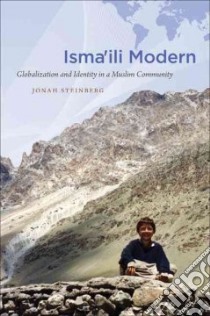- Libreria
- >
- Libri in lingua
- >
Isma'ili Modern - 9780807871652
Un libro in lingua di Jonah Steinberg edito da Univ of North Carolina Pr, 2011
- € 47.30
- Il prezzo è variabile in funzione del cambio della valuta d’origine
"This is a fascinating and unrivaled account of transnational Isma'ilism. Steinberg admirably brings together globalization theories and fascinating ethnographic material to produce a rich narrative of this interesting community. It will be the most important account of contemporary Isma'ilism yet published." --- Faisal Devji, author of The Terrorist in Search of Humanity: Militant Islam and Global Politics
"Jonah Steinberg's ethnographic accounts of meetings and encounters with Isma'ilis are fascinating and valuable, giving voice to the actors with respect to ethnicity, language, and religion. An incredibly innovative and provocative book." --- John Richard Bowen, author of Religions in Practice: An Approach to the Anthropology of Religion
The Isma'ili Muslims, a major sect of Shi'i Islam, form a community that is intriguing in its deterritorialized social organization. Informed by the richness of Isma'ili history, theories of transnationalism and globalization, and firsthand ethnographic fieldwork in the Himalayan regions of Tajikistan and Pakistan as well as in Europe, Jonah Steinberg investigates Isma'ili Muslims and the development of their remarkable and expansive twenty-first-century global structures.
Led by a charismatic European-based hereditary imam, Prince Karim Aga Khan IV, global Isma'ili organizations make available an astonishing array of services --- social, economic, political, and religious --- to some three to five million subjects stretching from Afghanistan to England, from Pakistan to Tanzania. Steinberg argues that this intricate and highly integrated network enables a new kind of shared identity and citizenship, one that goes well beyond the sense of community maintained by other diasporic populations. Of note in this process is the rapid assimilation in the postcolonial period of once-isolated societies into the intensively centralized Isma'ili structure. Also remarkable is the Isma'ilis' self-presentation, contrary to common characterizations of Islam in the mass media, as a Muslim society that is broadly sympathetic to capitalist systems, opposed to fundamentalism, and distinctly modern in orientation. Steinberg's unique journey into remote mountain regions highlights today's rapidly shifting meanings of citizenship, faith, and identity and reveals their global scale.
Informazioni bibliografiche
- Titolo del Libro in lingua: Isma'ili Modern
- Sottotitolo: Globalization and Identity in a Muslim Community
- Autore: Jonah Steinberg
- Editore: Univ of North Carolina Pr
- Collana: Univ of North Carolina Pr (Paperback)
- Data di Pubblicazione: 17 Gennaio '11
- Genere: RELIGION
- Pagine: 234
- ISBN-10: 0807871656
- EAN-13: 9780807871652


